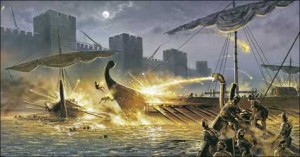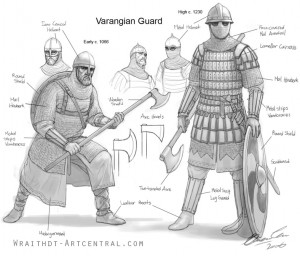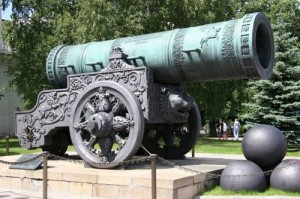 Reader Jeroen asked what happened to the once mighty Byzantine navy that forced them to become so reliant on Genoese or Venetian sea power?
Reader Jeroen asked what happened to the once mighty Byzantine navy that forced them to become so reliant on Genoese or Venetian sea power?
The Byzantine navy was in a way a victim of its own success- coupled with a complete lack of vision. By the end of the Macedonian dynasty, it was the preeminent force in the eastern Mediterranean. Major seaborne invasions were carried out against targets as far away as Sicily, and Sardinia, and the traditional naval powers of the Caliphate and the Russians were a receding threat. The last serious Arab attack had come in 1035 and the last Russian one a decade later, and they both had been beaten back with ease. There seemed no reason to pay for a huge navy with no one to fight, so Constantine IX (1042-55) had the fleet broken up into smaller units. These detachments spent most of their time chasing after pirates, and quickly faded from the imperial attention. Neglect and incompetence did the rest and by the end of the 11th century the fleet was in a deplorable position. Other navies sprang up to fill the vacuum and the aging, ill-equipped Byzantines were routinely defeated by Turkish, Italian, and even Norman ships. This humiliating state forced Alexius Comnenus (1081-1118) to sign an agreement with Venice exchanging trade concessions for naval support. To his credit he recognized the danger and did his best to build up the imperial navy with the meager resources available. By the time of his death he handed over a small but serviceable fleet to his successors, which was still strong enough to fend off the Venetians two decades later (at the steep cost of one of Enrico Dandolo’s eyes).
Alexius’ son and grandson, however, discovered that fleets are very expensive, and since they were more interested in land campaigns they transferred most of the funding to the army. The next dynasty (Angelus 1185-1204) was a good deal worse, dropping even the pretense of upkeep. They depended on trade concessions with Sicily, Venice, and Genoa to keep their coasts secure, and concentrated on having a good time. One particularly pathetic emperor (Alexius III Angelus) even allowed one of his generals to sell off the warships for personal profit, virtually abolishing the navy. By the time of the 4th Crusade there were only 20 ships left, 3 of which were seaworthy. The other 17 were loaded down with Greek Fire and pushed in the direction of the Crusader’s navy. Basil II must have been spinning in his grave.
 Listener William asked who the Varangians were and why they figured so prominently in Byzantine military affairs.
Listener William asked who the Varangians were and why they figured so prominently in Byzantine military affairs.
The Varangians were the elite forces of the Byzantine army- much like the Praetorian Guard of ancient Rome or the Ottoman Janissaries. They were originally made up exclusively of Vikings (which the empire had been hiring as mercenaries since the 9th century), but after the Norman Conquest of England a rush of exiled Anglo-Saxons were added to the mix. By the 12th century there were so many English that it was commonly being referred to as the ‘Anglo-Varangian’ Guard. As the empire declined, the Varangians also fell on hard times. By the middle of the 14th century they had largely ceased to function and the last mention of them is in the first decade of the 15th century.
They appeared relatively late in Byzantine history. In 988, the emperor Basil II, facing a serious revolt, asked the Viking prince of Kiev for some help. In exchange for an imperial bride, the prince sent along 6,000 warriors and Basil was so pleased by their effectiveness that he made them his permanent bodyguard. Their oaths were to him personally- a fact that the court was uncomfortably aware of- and they were housed in the Bucoleon Palace where they could keep an eye on things. Basil made sure they were given a generous salary and he called them ‘Varangians’- literally ‘men of the pledge’.
Since they were professional fighters they were the most valuable troops in an army made up mostly of mercenaries or levies. Usually taller and fiercer than their Mediterranean hosts/opponents, they also made good use as propaganda tools to overawe rebellious subjects or frighten opposing armies. In times of peace they could act as a police force in Constantinople or for ceremonial functions. In war they were usually held in reserve until the critical phase of the battle- then sent where the fighting was thickest. Even the Byzantines seem to have been slightly terrified of their berserker rages.
The opportunities for wealth ensured a steady stream of recruits, and few returned home empty-handed. At the death of an emperor they had the curious right to raid the treasury and take away whatever they could carry unassisted. Perhaps because of this they gained a reputation for fierce loyalty to the office- but not necessarily the occupant- of the throne.
At times the temptations of power were too much to resist and they would lord it over the population of Constantinople- usually in the local wine shops. Their drinking bouts were almost as legendary as their fighting skills and a visiting Danish king in the 11th century was embarrassed enough to publicly lecture them about their behavior.
His words do not appear to have had the desired effect. A century later some brave soul referred to the Varangians as the ‘Emperor’s wine-bags’.

Reader Bryan asked what I thought of the legend that Belisarius was blinded by Justinian. According to the story, a jealous and fearful Justinian arrested Belisarius after his final victory and had him tried for treason. The loyal general’s eyes were put out, his estates confiscated, and he was forced to wander the streets of Constantinople begging for bread while contemplating the vicissitudes of fortune.
Belisarius did briefly fall out of favor late in Justinian’s reign, but was publicly rehabilitated. The story of his blinding originated in the 12th century with the monk John Tzetzes who was trying to criticize the political figures of his own day. It made for a good morality tale, and was pressed into service in the 18th century by Europeans (mostly French) who saw a parallel between the tyranny of Justinian and their own autocratic societies. (see the spectacular painting by Jacques-Louis David and the play ‘Bélisaire’ by Jean-François Marmontel)
Some scholars still argue that the legend does have some basis in fact (Justinian was certainly capable of it), but there are several reasons not to accept it. The Crusaders who sacked Constantinople in 1204 mentioned several large statues of Belisarius still standing. Had he been blinded and disgraced these surely would have been torn down. Along the same lines there was also a great cycle of mosaics detailing the victories of Justinian and Belisarius above the gate to the imperial palace. These were made during Justinian’s lifetime and were still in place a thousand years later. Finally, there are the writings of the contemporary historian Procopius. In his ‘Secret History’ he makes no mention of the emperor humiliating his general, despite the fact that he clearly hated Justinian and was trying to blacken his name. He accuses Justinian of being a devil in the shape of a man, of being responsible for the deaths of a trillion people, and of having a head that would routinely disappear- but not of harming Belisarius.
Nevertheless the legend persists- perhaps because its lesson still resonates. As Henry Wadsworth Longfellow summed it up neatly in his poem about the great general:
“Ah! Vainest of all things
Is the gratitude of kings.”
 Reader Patricia asks if the Byzantine defeat in 1453 can really be blamed on ‘modern weapons’ since the Byzantines also had access to them. Was it really a matter of simply not having enough money to build them?
Reader Patricia asks if the Byzantine defeat in 1453 can really be blamed on ‘modern weapons’ since the Byzantines also had access to them. Was it really a matter of simply not having enough money to build them?
I think the Ottomans would have eventually been able to take the city in any case. It was far too exposed, depopulated, completely cut off from friendly Christian powers, and vastly outnumbered. But for all that, it still took 48 days of continuous bombardment. Given the tensions within the Ottoman army and the loss of face associated with each unsuccessful day, would Mehmed have been able to maintain discipline and morale if he had to wait on traditional siege machines? There were already serious challenges to his authority brewing by the time he broke in- and that was with the aid of ‘super’ weapons that could punch their way through walls. Constantine XI was fully capable of rallying his troops and did quite well with his limited forces. It’s always dangerous to speculate but I think he could have held the city against one or two standard Ottoman attempts.
So firepower was clearly important, but as Patricia correctly pointed out, it wasn’t just a simple matter of technology. The Byzantines actually did have a few guns- though they were smaller than the Ottoman’s and frequently damaged their own walls with the recoil. What they really lacked was the infrastructure needed to sustain the technology. Enough money couldn’t be scraped up to retain Urban much less pay for the powder, projectiles, and the specialists needed to fire and repair them. The Ottomans could afford to fully integrate massive new cannons into their army; for the impoverished Byzantines- even if Urban had built his great gun for free- they had to remain a curiosity.
 Reader Jeroen asked what happened to the once mighty Byzantine navy that forced them to become so reliant on Genoese or Venetian sea power?
Reader Jeroen asked what happened to the once mighty Byzantine navy that forced them to become so reliant on Genoese or Venetian sea power?

